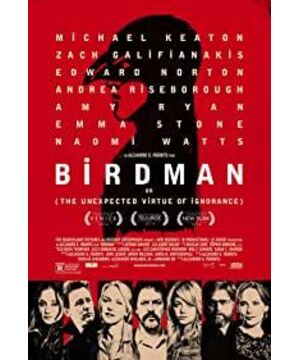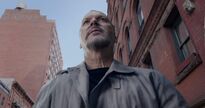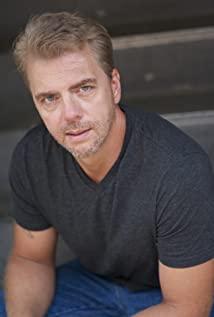In fact, the story is not complicated. The outdated middle-aged actor Riggan wrote and directed and acted in Carver’s short story "What are we talking about when we talk about love", trying to get rid of "birdman" with this serious Broadway work. Xia), this brought him fame and fortune, and also imprisoned his Hollywood image. Not surprisingly, along with career difficulties, there are serious problems with family relationships.
This stage play has become the solution he expected to solve the midlife crisis. But his confusion and struggle with self-realization and self-recognition surround him all the time.
In this seemingly old-fashioned story, "Birdman" has two very eye-catching features: one is the (pseudo) long shot that everyone talks about-hiding the editing point in a fast horizontal shift Either in a black screen, or using special effects to create a mirror effect, so that the film does not have the first cut point that can be clearly noticed by the audience until forty minutes later.
Photographer Emmanuel Lubezki took a step forward in "Birdman" after contributing the most beautiful long shot of 2013 at the beginning of "Gravity". But unlike the long, smooth, elegant, and immersive long lens of "Gravity", the lens of "Birdman" continues to follow the characters in the cramped corridors, and the feeling of seclusion can even make People feel dizzy and bored. In conjunction with percussion music as background music, this kind of uninterrupted depression forwards well to externalize the psychological situation of the characters.
After the last rehearsal, the camera stopped for a long time for the first time. It took more than ten seconds to look directly at a very narrow red corridor before Riggan slowly appeared, and the camera followed him into the dressing room. Combining the character's psychological state at this time, it was precisely after the fierce confrontation with him that he suddenly fell into a state of stagnation and numbness, which formed a good contrast.
Another feature is the ambiguous fit between the characters in the play and the actor's living conditions. Michael Keaton (Michael Keaton) is the protagonist of two Batman movies. After the rapid retreat, he appeared tepid and starred in this movie, which is exactly similar to Riggan's desperate resistance in making Broadway dramas.
Mike, played by Edward Norton, is also a similarly talented but very self-directed methodist actor. The ubiquitous reality filmmakers who appear in the dialogue between the characters and the film circle represented by superhero movies that Riggan has always been difficult to get rid of, the attitude of the film is full of irony.
And if this attitude is regarded as the point of view that the film wants to express, then the film falls into a cheap critique of the consumerist film industry, and thus encounters the paradox of resisting the structure in the structure: you are also in the Hollywood film industry. In this part of the world, your criticism can't get rid of the suspicion of fifty steps and one hundred steps of laughter.
However, due to the ambiguity in the setting of the characters in and out of the play, it breaks the stereotype of "the characters are false, and the film speaks by the characters". Because of the high degree of compatibility between the characters in the play and the real characters, the space of expression jumps out of the movie and moves toward The real world stretched out its tentacles.
In movies with actors as the narrative center, an important theme is the entanglement and struggle between their own image and stage image. The special profession of actor makes it easy to clearly distinguish the external image represented by the stage image and the true inner image in the narrative. As the protagonist, Riggan is accompanied by a concrete birdman: wearing a birdman costume, he constantly challenges Riggan's efforts to get rid of this image and tempts him to return to his self-image recognized by the outside world.
Riggan’s biggest problem is that he has a strong need for self-realization. His solution is to try to escape the image of the birdman and make people realize that he is a serious actor with artistic pursuits. The symbolic Broadway and Carver works have become his life-saving straw.
The entanglement also appears here, because he is actually using a symbolic pursuit to get rid of another kind of symbol, and seeking self-approval by external, label-like identification. This means that he does not actually have the self-confidence possessed by some "no madness, no life" artists, and cannot achieve self-realization by accepting himself.
What's even more terrifying is that in the pursuit of higher-level symbolic identification, he constantly self-doubts and self-rejection, because that birdman's external recognition seems to have become his true self. As the critic pointed out, he is just an untalented and tacky Hollywood star who still wants to do some real art under his own control. The scary thing is not that there is still a mountain on the other side of the mountain, but that I pointed to the direction of the sea, but I didn't have the ability to cross the hill to reach the sea.
This is a universal life crisis. Like most people, Riggan has difficulty in constructing a self-image with confidence. On the surface, he extremely rejects the self imposed on him by others, but in fact he extremely relies on external evaluation. Although he despised reporters who did not know Roland Barthes, he valued the feedback from the talented actor Mike.
This contradiction caused him to place a parabola in his emphasis on everyone and even his emotions, gradually rising and rapidly falling. As his wife pointed out, it is difficult for him to distinguish the difference between admiration and love.
On the contrary, Mike has found an existential solution, even though he can only seem to find a comfortable way of being on stage. But among truth and dare, he will always only want truth. The use of mirrors is emphasized in the film, and almost all the main actors have lens facing the mirror. And facing the self in the mirror, only he can be calm in all the roles.
The most impressive passage of "Birdman" is obviously the passage where Riggan finally flies up to the theater after a drunken night with a total failure of the preview. With the constant agitation of Birdman, Riggan finally flies to the theater. The external illusory image is now Have some kind of inspirational power. Here, I need to propose two potential texts, one is "I believe I can fly" as an inspirational song, and the other is the Icarus mentioned by Riggan, he wants to be.
The former is a positive, brainwashed and strong inspiration-I believe I can fly, then I will be able to fly; the latter is full of tragic fate-flying too high, the wings will be melted.
The concept of "flying" is full of contradictions under the dual potential text. That is to say, whether I accept the image that I do not agree with imposed by the outside world, I have long been imprisoned by such an image and it is difficult to realize myself. It is illusory and self-defeating to draw confidence from this image, but to say that I completely abandon this image, I have no such ability, or it must be a tragic ending.
Riggan, who couldn't get rid of this predicament, shot himself after citing the need for love (in fact, the need for identification) through the mouth of the character. But the irony is that he, who did not die, was dubbed "surrealism" by the critics, and became a symbolic image that is more advanced than a superhero, but essentially indistinguishable. His most decisive resistance to this predicament was instead wrapped up by society, creating a stronger shackle for him. The piece of gauze covering the face is more like a deformed version of Birdman's mask.
So, at the end of the film, he jumped, is it another decisive resistance, or finally accepting the image of Birdman, or breaking the puzzle of self-realization and finding leisurely freedom?
The film did not give an answer. Facing such a dilemma, there is no answer.
bundpic
View more about Birdman or (The Unexpected Virtue of Ignorance) reviews











